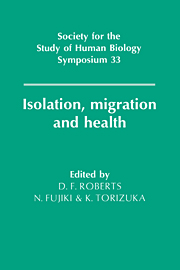Book contents
- Frontmatter
- Contents
- List of contributors
- Preface
- 1 The legacy of the IBP: Presidential Address
- 2 The distinction between primary and secondary isolates
- 3 Time trends in the break-up of isolates
- 4 Factors influencing the frequency of consanguineous marriages in Japan
- 5 Break-up of isolates
- 6 Isolates in India: their origin and characterisation
- 7 Consanguineous marriages and their genetical consequences in some Indian populations
- 8 Biomedical and immunogenetic variation in isolated populations in India
- 9 Genetic distance analyses in Israeli groups using classical markers and DNA polymorphisms in the β globin gene
- 10 Non-random distribution of Gm haplotypes in northern Siberia
- 11 Allele frequency estimation
- 12 Genetic affinities of human populations
- 13 Inherited neurological diseases in island isolates in southern Japan
- 14 Serological and virological evidence for human T-lymphotropic virus type I infection among the isolated Hagahai of Papua New Guinea
- 15 Analysis of genes associated with hypercholesterolaemia in the Japanese population
- 16 Migrant studies and their problems
- 17 Tokelau: migration and health in a small Polynesian society - a longitudinal study
- 18 Micromigrations of isolated Tuareg tribes of the Sahara Desert
- 19 Population structure in the eastern Adriatic: the influence of historical processes, migration patterns, isolation and ecological pressures, and their interaction
- 20 Diabetes and diabetic macroangiopathy in Japanese-Americans
- 21 Diabetes and westernisation in Japanese migrants
- 22 Environmental factors affecting ischemic heart disease
- Epilogue
- Index
22 - Environmental factors affecting ischemic heart disease
Published online by Cambridge University Press: 05 March 2012
- Frontmatter
- Contents
- List of contributors
- Preface
- 1 The legacy of the IBP: Presidential Address
- 2 The distinction between primary and secondary isolates
- 3 Time trends in the break-up of isolates
- 4 Factors influencing the frequency of consanguineous marriages in Japan
- 5 Break-up of isolates
- 6 Isolates in India: their origin and characterisation
- 7 Consanguineous marriages and their genetical consequences in some Indian populations
- 8 Biomedical and immunogenetic variation in isolated populations in India
- 9 Genetic distance analyses in Israeli groups using classical markers and DNA polymorphisms in the β globin gene
- 10 Non-random distribution of Gm haplotypes in northern Siberia
- 11 Allele frequency estimation
- 12 Genetic affinities of human populations
- 13 Inherited neurological diseases in island isolates in southern Japan
- 14 Serological and virological evidence for human T-lymphotropic virus type I infection among the isolated Hagahai of Papua New Guinea
- 15 Analysis of genes associated with hypercholesterolaemia in the Japanese population
- 16 Migrant studies and their problems
- 17 Tokelau: migration and health in a small Polynesian society - a longitudinal study
- 18 Micromigrations of isolated Tuareg tribes of the Sahara Desert
- 19 Population structure in the eastern Adriatic: the influence of historical processes, migration patterns, isolation and ecological pressures, and their interaction
- 20 Diabetes and diabetic macroangiopathy in Japanese-Americans
- 21 Diabetes and westernisation in Japanese migrants
- 22 Environmental factors affecting ischemic heart disease
- Epilogue
- Index
Summary
Most diseases, their occurrence and progression, are affected by genetic and environmental factors. In searching for genetic influences in disease it is important to investigate different races or groups living in similar environments. On the other hand, it is important also to simplify the many environmental factors when seeking environmental effects on the onset or progression of diseases in groups having similar genetic background. These two strategies of investigation, varying genetic constitution within similar environments and varying environments but constant genetic constitution, are complementary.
In ischemic heart disease (IHD), several factors such as hypertension (Kannel et al., 1971a; WHO, 1982), hyperlipoproteinaemia (Keys et al., 1958; Kinch et al., 1963; Kannel et al., 1971b), diabetes mellitus (Donahue et al., 1987; Fuller et al., 1980), obesity (Gordon & Kagan, 1981), and smoking habit (Mimura et al., 1984) are thought to be related to its progression. These risk factors are influenced, at least in part, by environmental factors. Out of these environmental factors, dietary habit is suggested by many epidemiological studies to be one of the most important. Furthermore, dietary habit varies with the climate, geographical location, socioeconomic situation, and culture and history of the population.
This study compared the structure and background risk factors of IHD together with the nutritional situation in Okinawans and in migrants from Okinawa who were living in Honolulu without intermarriage (Okinawan-American). The leading causes of death are different, IHD and malignant neoplasia in Okinawan-American and Okinawan, respectively, in spite of their having the same genetic ancestry and living in climates of similar temperature (except in the winter season).
- Type
- Chapter
- Information
- Isolation, Migration and Health , pp. 240 - 248Publisher: Cambridge University PressPrint publication year: 1992



